 That is, if a quadratic equation be reduced to the form x?+px = q, the algebraic sum of the roots is equal to the coefficient of x with its sign changed, and the product of the roots is equal to the second member, with its sign changed. That is, if a quadratic equation be reduced to the form x?+px = q, the algebraic sum of the roots is equal to the coefficient of x with its sign changed, and the product of the roots is equal to the second member, with its sign changed.  First Principles of Algebra: Elementary Course - Page 202by Herbert Ellsworth Slaught, Nels Johann Lennes - 1912 - 280 pagesFull view First Principles of Algebra: Elementary Course - Page 202by Herbert Ellsworth Slaught, Nels Johann Lennes - 1912 - 280 pagesFull view - About this book
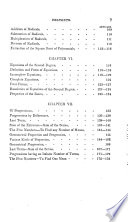 | Charles Davies - Algebra - 1839 - 272 pages
...fourth form both the roots are positive. 2nd. That the first root is greater than the second. 3rd. That the sum of the roots is equal to the coefficient of x in the second term, taken with a contrary sign. 4th. That the product of the roots is equal to the... | |
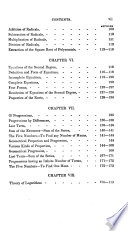 | Charles Davies - Algebra - 1842 - 284 pages
...the other negative. 2nd. That the positive root is numerically greater than the negative. 3rd. That the sum of the roots is equal to the coefficient of x in the second term, taken with a contrary sign. 4th. That the product of the roots is equal to the... | |
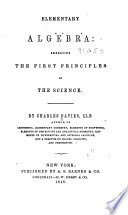 | Charles Davies - Algebra - 1848 - 302 pages
...fourth form both the roots are positive. 2nd. That the first root is greater than, the second. 3rd. 77m/ the sum of the roots is equal to the coefficient of X in the second term, taken with a contrary sign. 4th. That the product of the roots is equal to the... | |
 | G. Ainsworth - 1854 - 216 pages
...8x2-7x+34=0. 6. 6x2=37x-5C. When a quadratic is reduced to the form x2+px + q=0, the sum of the values of x is equal to the coefficient of x with its sign changed, and the product of the values of x is equal to the third term q. Let a and ß represent the values adding, a+ß= —p ; and... | |
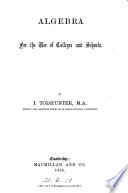 | Isaac Todhunter - Algebra - 1858 - 530 pages
...coefficient of the first term is unity, the sum of the roots is equal to the coefficient of the second term with its sign changed, and the product of the roots is equal to the last term. For the roots of аx' + bx + с = 0 are -b + jp-iac) -bJ(Jt-4M) ~2a~ !" -~2a~ -' hence the... | |
 | Isaac Todhunter - Algebra - 1863 - 302 pages
...the unknown quantity is unity, the sum of the roots is equal to the coefficient of the second term with its sign changed, and the product of the roots is equal to the last term. For let the equation be a? +px + q = 0 ; the turn of the roots is the product of the roots... | |
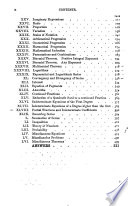 | Isaac Todhunter - Algebra - 1866 - 580 pages
...the terms are all on one side, the sum of the roots is equal to the coefficient of the second term with its sign changed, and the product of the roots is equal to the last term. For the roots of ax3 + Ъх + с = 0 are _ ílliU т: 2a hence the sum of the roots is —... | |
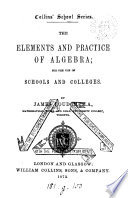 | James Loudon - Algebra - 1873 - 314 pages
...together the values of a and b, we obtain a+b = —p, ab=q. Hence the sum of the roots of a?+px-\-q=0 is equal to the coefficient of x with its sign changed, and the product of the roots is equal to the absolute term q. Thus in the equation a?+5x — 8 = 0, the sum of the roots is —5, and their product... | |
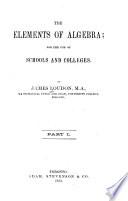 | James Loudon - Algebra - 1873 - 360 pages
...together the values of a and b, we obtain a-\-b= —p, a & = }. Hence the sum of the roots of a?+px+q=Q is equal to the coefficient of x with its sign changed, and the product of the roots is equal to the absolute term q. Thus in the equation ar"+5a; — 3 = 0, the sum of the roots is —5, and their product... | |
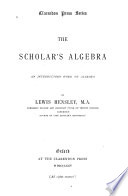 | Lewis Hensley - Algebra - 1875 - 274 pages
...2<Z v I za l> a' by addition, and whence we learn that, if the expression be written in form (ii), I. The sum of the roots is equal to the coefficient of x with its sign changed ; II. The product of the roots is equal to the last term. This term, which is independent of x, is... | |
| |